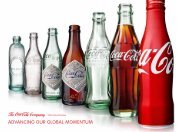Water Stewardship and Replenish Report - Psddev.com
Water Stewardship and Replenish Report - Psddev.com
Water Stewardship and Replenish Report - Psddev.com
You also want an ePaper? Increase the reach of your titles
YUMPU automatically turns print PDFs into web optimized ePapers that Google loves.
Providing <strong>Water</strong> for Schools<br />
Since our CWP program began, we have provided water or water <strong>and</strong> sanitation facilities to nearly 400 schools, directly<br />
benefiting more than 206,000 students in over 25 countries throughout Africa, Latin America, <strong>and</strong> Asia. In addition, many of<br />
our water education <strong>and</strong> awareness activities coordinate with schools in approximately 15 countries as focal points to help students,<br />
teachers, <strong>and</strong> <strong>com</strong>munity members learn about hygiene, water conservation, watershed management, <strong>and</strong> environmental protection.<br />
This promotes healthier livelihoods while delivering benefits well beyond the classroom.<br />
Notably, RAIN includes a special focus on schools to help increase attendance, enhance hygiene behaviors, <strong>and</strong> improve health among<br />
both children <strong>and</strong> adults. RAIN <strong>Water</strong> for Schools is working with the South Africa Department of Basic Education, the Mvula Trust, <strong>and</strong><br />
H2O for Life to bring clean drinking water, gender-segregated latrines, <strong>and</strong> hygiene education to 100 schools <strong>and</strong> over<br />
60,000 students in South Africa by 2012.<br />
A similar, but smaller, project in Cameroon promoted child rights in water <strong>and</strong> sanitation, provided <strong>com</strong>munity-based hygiene<br />
education, delivered latrines <strong>and</strong> wells in schools, <strong>and</strong> trained local water management <strong>com</strong>mittees. In Bolivia, the <strong>Water</strong> for Schools<br />
program is providing health <strong>and</strong> hygiene education to 5,200 students <strong>and</strong> teachers in the local schools, installing 16 latrines,<br />
<strong>and</strong> donating technology resources <strong>and</strong> libraries to further strengthen the educational experience. And in many other locations around<br />
the world, our water-focused education <strong>and</strong> awareness efforts are reaching more than 8 million students <strong>and</strong> adults<br />
through school-based programs <strong>and</strong> other <strong>com</strong>munity water projects.<br />
Un-HABITAT <strong>and</strong> Coca-Cola: Sustainable Shelter <strong>and</strong> Safe <strong>Water</strong> in Urban Settings<br />
The United Nations Human Settlements Programme (UN-HABITAT) promotes socially <strong>and</strong> environmentally sustainable towns <strong>and</strong><br />
cities with the goal of providing adequate shelter for all. Its work is especially critical today as urban areas continue growing at<br />
unprecedented rates, with cities now considered home by half of the world’s population.<br />
The Coca-Cola Company’s partnership with Un-HABITAT for water conservation, which began in 2007, provides<br />
access to water <strong>and</strong> sanitation, <strong>com</strong>munity-based rainwater harvesting, <strong>and</strong> groundwater recharge projects in India<br />
<strong>and</strong> other rapidly urbanizing countries. The partnership supports several of the UN Millennium Development Goals, especially<br />
Goal 7 related to reducing by half the number of people without sustainable access to safe drinking water.<br />
To date, UN-HABITAT <strong>and</strong> The Coca-Cola Company have collaborated under the <strong>Water</strong> for Asian Cities program on pilot demonstration<br />
projects that have benefitted more than 1 million residents of urban <strong>and</strong> peri-urban <strong>com</strong>munities through education, water<br />
access, <strong>and</strong> sanitation initiatives. In Madhya Pradesh, India, for example, the program is augmenting source water with rainwater<br />
harvesting <strong>and</strong> new storage facilities at 16 schools. In West Bengal, the program is bringing safe drinking water to 150 schools.<br />
And in Nepal, improved water management, hygiene, <strong>and</strong> sanitation are part of a new partnership for safe water. As the <strong>Water</strong><br />
for Asian Cities program gathers momentum, several organizations are joining forces, enabling us to reach even more people. The<br />
partnership has now exp<strong>and</strong>ed to Bangladesh, Pakistan, Vietnam, Cambodia, <strong>and</strong> other countries, while inspiring new public-private<br />
coalitions for urban water <strong>and</strong> sanitation.<br />
< pg 18 pg 19 >




